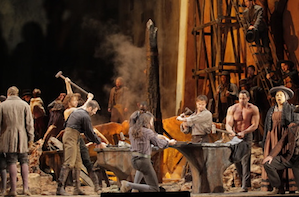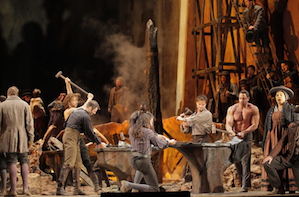
Photo by Ken Howard/The Metropolitan Opera
Going even beyond the extended deadline for a lockout at midnight, Metropolitan Opera management reached tentative contract agreements in the early hours of Monday with Musicians' Union Local 802, representing the orchestra, and AGMA, which negotiates for individual singers and dancers and the Met Chorus. The announcement means negotiators broke a deadlock that jeopardized both the fall season and the future of the country's oldest and largest opera company.
Talks with the International Alliance of Theatrical Stage Employees Local 1 resume today, and negotiations with other unions will follow. Barring the emergence of a major problem, and with union ratification, the crisis should be settled. No information about terms has been released, but The New York Times reported on Tuesday compromises from both sides:
The unions representing the orchestra and chorus recognized the financial fragility of the opera house and agreed to their first pay cut in decades, while management abandoned its toughest demands and agreed to make significant reductions of its own, with independent oversight.
At the time of the Met threat of a lockout, management proposed cutting pay by 17 percent, saying that the opera was facing “one of the biggest financial challenges in its 131-year history” — a combination of declining box office income and rising labor costs that have left the Met dependent on record-breaking fund-raising and heavy spending from its endowment.
The unions resisted, countering that management could find savings elsewhere in a budget that has grown steeply in recent years, hitting $327 million in 2013. They have called for scaling back some of the initiatives undertaken since Peter Gelb became the Met’s general manager in 2006, especially his decision to increase the number of new productions each year.

